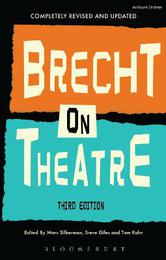
|
Brecht On Theatre
Hardback
Main Details
Description
Brecht on Theatre is a seminal work that has remained the classic text for readers and students wanting a rich appreciation of the development of Brecht's thinking on theatre and aesthetics. First published in 1964 and on reading lists ever since, it has now been wholly revised, re-edited and expanded with additional texts, illustrations and editorial material, and new translations. The resulting work is a far fuller and more accurate volume that will provide readers with a clearer and more rewarding understanding of Brecht's work and writings. This updated third edition features: * Clearer layout and organisation of the text to facilitate study * New translations of many of the Brechtian texts featured * Over 40 new, previously untranslated essays * Essay titles now correspond to the German originals * A revised selection of illustrations This selection of Bertolt Brecht's critical writing charts the development of his thinking on theatre and aesthetics over four decades. The volume demonstrates how the theories of Epic Theatre and Verfremdung evolved, and contains notes and essays on the staging of The Threepenny Opera, Mahagonny, Mother Courage, Puntila, Galileo and many others of his plays. Also included is 'Short Organon for the Theatre', Brecht's most complete statement of his revolutionary philosophy of the theatre.
Author Biography
Bertolt Brecht (1898-1956) is acknowledged as one of the great dramatists whose work has had a considerable influence on the theatre. His landmark plays include The Threepenny Opera, The Life of Galileo, and The Caucasian Chalk Circle. Editors: Marc Silberman is Professor of German at the University of Wisconsin - Madison, USA. Steve Giles is Emeritus Professor of German Studies and Critical Theory at the University of Nottingham, UK. Tom Kuhn is Professor of 20th century German Literature at St Hugh's College, University of Oxford, UK, and General Editor of Bloomsbury Methuen Drama's Brecht publications.
ReviewsBrecht on Theatre has long introduced countless readers to the theatre theories of Bertolt Brecht. Originally compiled and edited by John Willett in 1964, the volume was innovative and comprehensive in its time: essays only recently published in German were suddenly available in English, offering insights into the development of ideas stretching from 1918 to days before Brecht's death in 1956. However, Brecht scholarship and the needs of an interested public have changed greatly over the intervening fifty years, and the new edition ... addresses several important issues. First, there is simply the amount of new material that has come to light over the years ... Second, the retained essays have been judiciously retranslated and their titles have been returned to more literal renditions ... Third, the volume has great intellectual coherence. Rather than imitating Willett's adherence to chronology, the editors acknowledge the principle while diverging on occasion to group thematically related terms and thus allow a clearer overview of Brecht's evolving thoughts. -- David Barnett * New Theatre Quarterly * The new Brecht on Theatre improves on John Willett's original version, introducing some enlightening texts that were not previously accessible to an English-speaking readership ... Finely conceived and beautifully edited. -- Michael Wood, University of Edinburgh, UK * Modern Language Review * Though this third edition draws on Willett's original, it is an autonomous publication in many respects. Almost half of the material is new in English translation ... The additions, often pragmatic in nature, reveal him wrestling with the relationship of both actor and spectator to theatrical work, each other, and society. [This book] will allow Anglophone scholars and performance practitioners to revisit Brecht's influence as a writer, theoretician, and theatre maker specifically, but also - more generally - the relationship between political thought and aesthetics, and between the theory and the practice of making art. * TDR: The Drama Review *
|